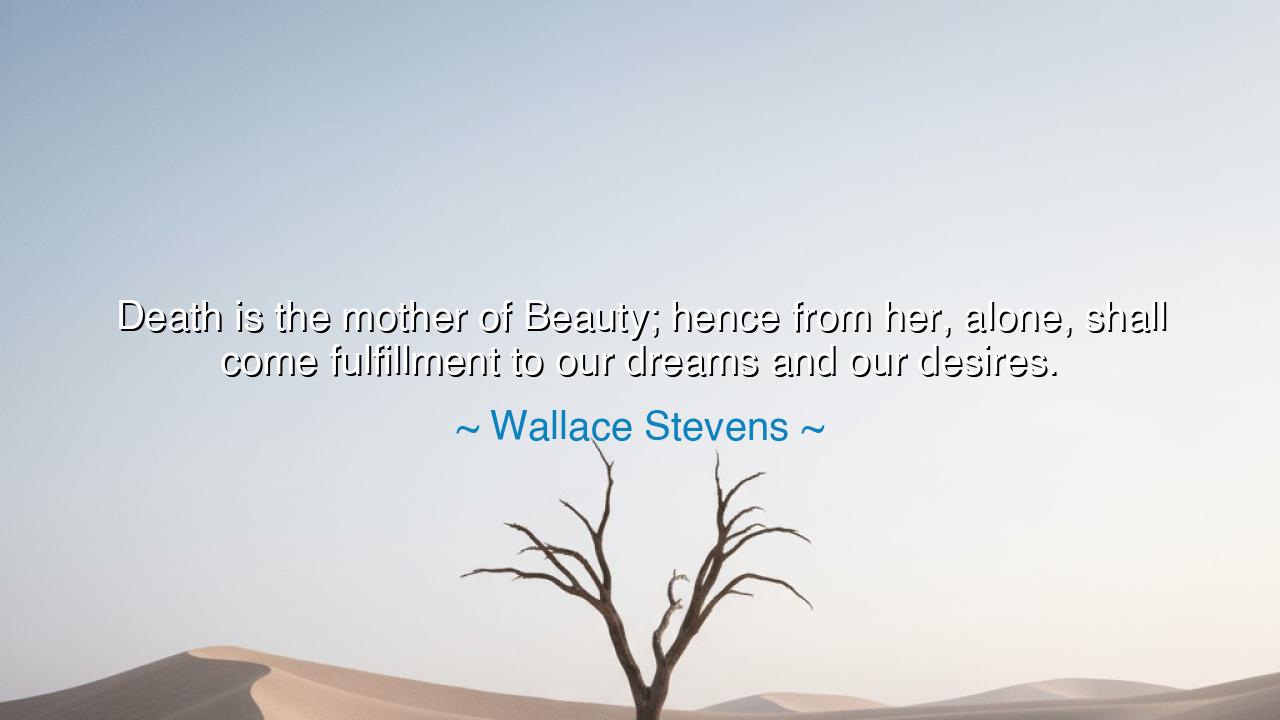
Death is the mother of Beauty; hence from her, alone, shall come
Death is the mother of Beauty; hence from her, alone, shall come fulfillment to our dreams and our desires.






"Death is the mother of Beauty; hence from her, alone, shall come fulfillment to our dreams and our desires." These poignant words by Wallace Stevens offer a profound reflection on the role of mortality in shaping the beauty we experience in life. Stevens, in his poetic insight, suggests that the very awareness of death gives life its purpose and depth. It is the fleeting nature of existence, the inevitability of mortality, that imbues our dreams, desires, and experiences with their fullest significance. Without death, beauty would be meaningless, for it is the transience of life that makes each moment precious, each experience meaningful, and each desire worth pursuing.
In the ancient world, the concept of death was not something to be feared, but rather something to be respected and understood as a natural part of the human experience. The Greeks, especially the philosophers like Heraclitus, often meditated on the impermanence of all things. Heraclitus famously said, "You cannot step into the same river twice," implying that all things are in a state of constant flux, including life itself. The Stoics, like Epictetus and Marcus Aurelius, recognized that death was an inevitable end, and instead of avoiding it, they sought to live virtuous lives that would give their actions meaning within the short time they had. For the ancients, the awareness of mortality gave urgency and value to every choice, every action, every pursuit.
The Romans shared a similar view, seeing death as both an end and a necessary transformation. Virgil’s Aeneid, for instance, is a tale of heroic sacrifice and the realization that the hero's personal desires are intertwined with the needs of the greater good—a truth grounded in the impermanence of human life. Aeneas must reconcile his personal longing for peace with the duty he feels to his people, and through his journey, he learns that the greatness of his mission can only be fulfilled through his own acceptance of his mortality and his place in the grand scheme of things. Death, in this sense, is not an end but a force that shapes and defines the beauty of his life's purpose.
In the modern world, Wallace Stevens presents death not as something to be feared, but as a catalyst for understanding the true nature of beauty. Beauty, Stevens argues, arises from the transitory nature of existence—the fact that all things are fleeting. Art, in particular, gains its power from this tension between life and death. Vincent van Gogh, for instance, found beauty not in the permanence of his surroundings but in the vividness of his emotional expression captured in his paintings. His suffering, his awareness of life’s fleeting nature, and his deep connection to his emotions allowed him to paint with a raw intensity that transcended the mundane and touched on something eternal. Van Gogh’s works, like the swirling skies of Starry Night, speak to the beauty that emerges when one fully embraces life’s transience, knowing that its moments are limited but profound.
The lesson in Stevens’ words is one of awareness and acceptance. Death, as the ultimate inevitability, forces us to confront the fragility of our lives and the impermanence of everything we hold dear. However, rather than being a source of despair, this realization brings a deeper appreciation for the beauty of life. Beauty is not found in the permanence of things, but in their ephemeral nature, in the fleeting moments of joy, sorrow, love, and longing that define our existence. It is through death that we come to understand the value of the present moment and the transformation that each fleeting experience can bring.
In our own lives, we must learn to live with awareness of death, not as a burden, but as a guiding force that impels us to make the most of our time. The awareness that we are mortal encourages us to engage more fully with life, to appreciate beauty in all its forms, and to embrace the fleeting nature of our experiences. Just as artists, poets, and philosophers have drawn inspiration from their understanding of mortality, we too can live a life that is richer, fuller, and more deeply connected to the beauty that surrounds us. By acknowledging death, we find the courage to live authentically, to pursue our dreams, and to transform the ordinary into something extraordinary.
Let us, then, embrace the beauty of life with the understanding that it is our awareness of death that makes life truly meaningful. Every moment we have is precious because it is fleeting, and it is this very transience that gives our dreams, desires, and creations their deepest significance. Just as art reflects the beauty of our human experience, so too can we create lives that are rich in meaning, filled with beauty, and made all the more precious by the knowledge that each moment is a gift. Through this understanding, we come to see that death is not our enemy, but the mother of beauty, giving shape and substance to the fleeting nature of all that we cherish.






AAdministratorAdministrator
Welcome, honored guests. Please leave a comment, we will respond soon